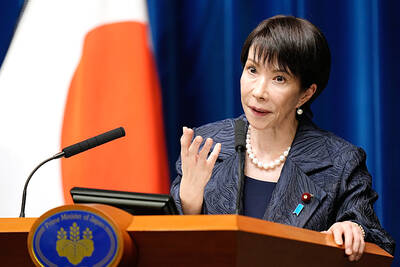Taipei City’s Health Department yesterday said traces of melamine were found in 10 more types of Nestle and Klim milk powder manufactured in China, and it demanded stores pull the products from shelves.
The Executive Yuan’s Department of Health had found traces of melamine in six types of Nestle milk powder and ordered a recall of 20 products last week — following random tests by local health bureaus — and expanded the scale of tests to include more products.
Chiang Yu-mei (姜郁美), director of the Taipei Health Department food and drug division, said the results of the latest round of random tests came in yesterday.
A total of 16 types of Nestle and Klim milk powder, including the six types already pulled from shelves, contained between 0.06 parts per million (ppm) and 0.85ppm of melamine.
All the tainted products were made by the Shuangcheng Nestle company in Heilongjiang Province and had been pulled from shelves, she said.
Nine types of Nestle milk powder imported from the Netherlands, Switzerland, Germany and the Philippines tested negative for melamine and were therefore not recalled, she said.
The national Department of Health had earlier raised the acceptable level for melamine content in food to 2.5ppm, but later decided to employ its most sensitive testing method — liquid chromatography/tandem mass spectrometry (LC-MS/MS) — to check for melamine.
LC-MS/MS can detect melamine levels as low as 0.05ppm, health officials said.
Chiang said yesteday that his division would continue conducting random tests on products in stores to ensure public safety.
Health officials can be contacted with questions regarding products at 02-2720-8889, ext. 7077.
Nestle is one of the leading brands for infant and adult milk products. Klim is one of scores of brands owned by Nestle. The Swiss multinational brought the brand in 1998 from the US dairy and chemical company Bordon.

The Ministry of Foreign Affairs (MOFA) yesterday voiced dissatisfaction with the Comprehensive and Progressive Agreement for Trans- Pacific Partnership (CPTPP), whose latest meeting, concluded earlier the same day, appeared not to address the country’s application. In a statement, MOFA said the CPTPP commission had "once again failed to fairly process Taiwan’s application," attributing the inaction to the bloc’s "succumbing to political pressure," without elaborating. Taiwan submitted its CPTPP application under the name "Separate Customs Territory of Taiwan, Penghu, Kinmen and Matsu" on Sept. 22, 2021 -- less than a week after China

THE GOOD WORD: More than 100 colleges on both sides of the Pacific will work together to bring students to Taiwan so they can learn Mandarin where it is spoken A total of 102 universities from Taiwan and the US are collaborating in a push to promote Taiwan as the first-choice place to learn Mandarin, with seven Mandarin learning centers stood up in the US to train and support teachers, the Foundation for International Cooperation in Higher Education of Taiwan (FICHET) said. At the annual convention of the American Council on the Teaching of Foreign Languages held over the weekend in New Orleans, Louisiana, a Taiwan Pavilion was jointly run by 17 representative teams from the FICHET, the Overseas Community Affairs Council, the Steering Committee for the Test of Proficiency-Huayu, the

A home-style restaurant opened by a Taiwanese woman in Quezon City in Metro Manila has been featured in the first-ever Michelin Guide honoring exceptional restaurants in the Philippines. The restaurant, Fong Wei Wu (豐味屋), was one of 74 eateries to receive a “Michelin Selected” honor in the guide, while one restaurant received two Michelin stars, eight received one star and 25 were awarded a “Bib Gourmand.” The guide, which was limited to restaurants in Metro Manila and Cebu, was published on Oct. 30. In an interview, Feng Wei Wu’s owner and chef, Linda, said that as a restaurateur in her 60s, receiving an

MORE RETALIATION: China would adopt a long-term pressure strategy to prevent other countries or future prime ministers following in Sanae Takaichi’s steps, an academic said Taiwan should maintain communications with Japan, as Japanese Prime Minister Sanae Takaichi is to lead a revision of security documents, Taiwanese academics said yesterday. Tensions have risen between Japan and China over remarks by Takaichi earlier this month that the use of force against Taiwan would constitute a “survival-threatening situation” for Japan. Prospect Foundation president Lai I-chung (賴怡忠) yesterday said Takaichi’s stance regarding Taiwan is the same as past Japanese prime ministers, but her position is clearer than that of her predecessors Fumio Kishida and Shigeru Ishiba. Although Japan views a “Taiwan contingency” as a “survival-threatening situation,” which would allow its military to